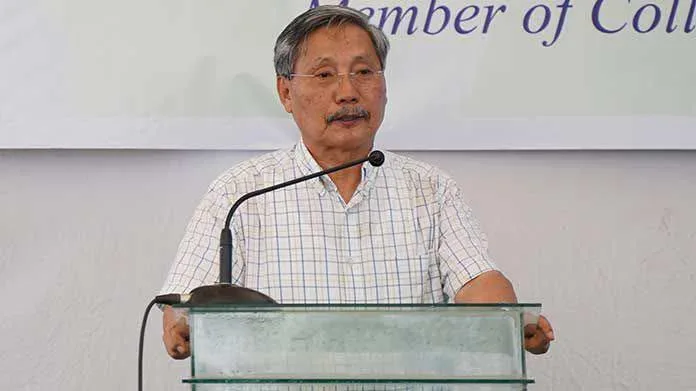DIMAPUR, April 22: Deputy Ato Kilonser of the NSCN (IM), Lt Gen (retd) VS Atem, has stated that the recent departure of Ikato Chishi Swu will not impact the group’s structure or operations. “It will not affect us,” Atem said when asked about the implications of Ikato’s exit. Ikato is the son of the late Isak Chishi Swu, one of the co-founders of NSCN (IM) along with Thuingaleng Muivah.
Atem made the remarks on the sidelines of a ‘Consultative Meeting’ held at Nguvihe village in Niuland district on April 21. The meeting was attended by Vice President Tongmeth Wangnao and other members of the NSCN (IM) Collective Leadership, along with Aghunaqa area frontal organisations led by village chiefs.
Ikato Chishi Swu had announced on April 17 that he was leaving the NSCN (IM) and joining forces with Lt Gen (retd) Hs Ramsan and Lt Gen Absalom Raman. Ramsan and Raman were previously high-ranking members of NSCN (IM) — serving as Executive Member of the Steering Committee and Deputy Chief of the Army, respectively — before being expelled in July 2024 for alleged “anti-national activities.”
In his statement, Ikato accused the NSCN (IM) leadership of collusion with Indian intelligence agencies, which he claimed had demoralized and corrupted the organization, undermining the Naga national interest.
VS Atem strongly refuted these allegations, stating, “There is no collusion, there is no conspiracy at all.” He emphasized that the NSCN (IM) members would “fight to the finish, till justice, our rights are recognized and our stand is accepted.”
Atem said that the consultative meeting was held at the invitation of the people of Aghunaqa, and similar engagements were expected in other regions. He noted that people are anxious about their future. “When the people have invited us, we feel that we are fortunate,” he said.
A key concern raised during the meeting was the Assam-Nagaland boundary dispute, particularly affecting villages in the Disputed Area Belt (DAB), which includes much of the Western Sumi and Aghunaqa area. Local leaders voiced the difficulties faced by these neglected villages.
Atem reiterated the NSCN (IM)’s stance that the historical division of Naga land by the British for their political and commercial interests must be corrected. Drawing a parallel between the Indian independence struggle and the Naga movement, he emphasized that the Nagas were an independent people before external forces arrived. He dismissed the 16-Point Agreement that led to the formation of Nagaland state as a memorandum rather than a binding accord.
He said the goal of the NSCN (IM) remains the restoration of lost Naga rights. On the Framework Agreement signed with the Government of India, Atem clarified that it envisions a political relationship where sovereign functions are shared, advocating for peaceful coexistence rather than assimilation.
NSCN (IM) Vice President Tongmeth Wangnao warned against being distracted by disruptive elements. Kughalu Aye, President of the Border Peace Committee, highlighted the confusion and anxiety among the people over the two separate agreements signed by the Government of India — one with the NSCN (IM) and the other with the Working Committee of the NNPGs. He urged for unity and consensus among all groups.
Mughavi Awomi, former President of the Western Sumi Youth Front, asserted that the Aghunaqa area must be accounted for in any final settlement. He reminded that Aghunaqa was the first to declare support for the Framework Agreement.
Collective Leadership Member Vikiye Awomi stated that the Assam-Nagaland border issue is included among the “competencies” of the Framework Agreement and cannot be resolved through judicial means, but through political dialogue.
Kughato Awomi, President of Aghunaqa Kukami Kuqhakulu, highlighted the persistent neglect faced by villages in the DAB and pointed out the absence of Nagaland Police in the area, despite ongoing challenges.

